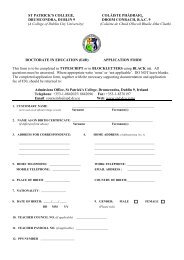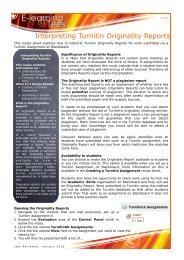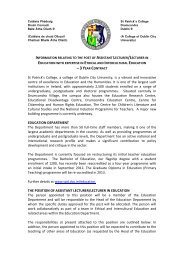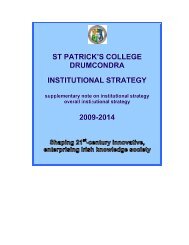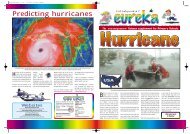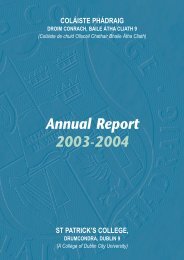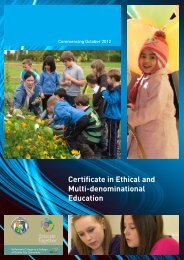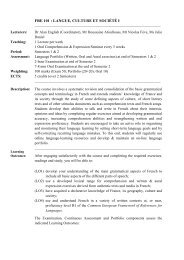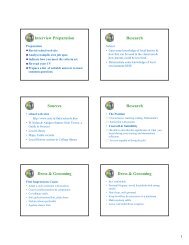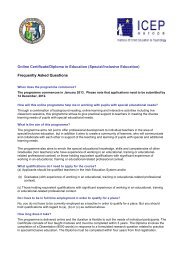Careers for Arts, Humanities and Social Science Graduates
Careers for Arts, Humanities and Social Science Graduates
Careers for Arts, Humanities and Social Science Graduates
Create successful ePaper yourself
Turn your PDF publications into a flip-book with our unique Google optimized e-Paper software.
the following autumn. They usually consider<br />
graduates of all disciplines, though a postgraduate<br />
qualification in business studies can help. Skills<br />
sought include numeracy, analytical,<br />
communication <strong>and</strong> interpersonal <strong>and</strong>, <strong>for</strong> front-line<br />
posts, the ability to drive <strong>for</strong>ward <strong>and</strong> exp<strong>and</strong><br />
business.<br />
See gradirel<strong>and</strong> Finance, available from your<br />
<strong>Careers</strong> Service, <strong>for</strong> more in<strong>for</strong>mation.<br />
The legal profession welcomes entrants from<br />
non-law as well as law graduates. The profession is<br />
divided into the two distinct areas of solicitors <strong>and</strong><br />
barristers. Solicitors deal with clients directly <strong>and</strong><br />
may consult a barrister <strong>for</strong> specialist advice on<br />
complex legal issues relating to a client’s case.<br />
Barristers are also primarily responsible <strong>for</strong><br />
presenting cases in court.<br />
Training is both academic <strong>and</strong> professional <strong>and</strong><br />
separately carried out by the relevant professional<br />
bodies. You can find details on their websites (see<br />
page 16). In the case of solicitors, training<br />
incorporates a period of around 18 months in a<br />
solicitors’ office.<br />
Areas of practice in both spheres are diverse, <strong>and</strong><br />
career prospects have exp<strong>and</strong>ed in recent years.<br />
See gradirel<strong>and</strong> Law, available from your <strong>Careers</strong><br />
Service, <strong>for</strong> more in<strong>for</strong>mation.<br />
Language-related jobs<br />
Languages are increasingly important to meet the<br />
opportunities <strong>and</strong> challenges offered at home <strong>and</strong><br />
abroad by the global business market, <strong>and</strong> work<br />
opportunities in translating <strong>and</strong> interpreting are<br />
growing. The influx of Eastern Europeans <strong>and</strong><br />
people from non-EU countries into Irel<strong>and</strong> has<br />
created the need <strong>for</strong> linguists fluent in their<br />
languages, with work here more prevalent in the<br />
public than in the private sector. To work within EU<br />
institutions, two EU languages are usually required<br />
in addition to your mother tongue.<br />
Most translators <strong>and</strong> interpreters translate into<br />
their mother tongue. While language fluency is<br />
essential <strong>for</strong> translation work, mastery of a<br />
language is needed <strong>for</strong> interpreting because of the<br />
more immediate nature of the work. Many<br />
interpreters are bilingual from an early age.<br />
Specialist language jobs arise in technical areas<br />
such as localisation of software packages (adapting<br />
these to different countries), while some website<br />
designers need linguists to help them reach their<br />
global audience.<br />
Aside from translating <strong>and</strong> interpreting, areas<br />
where language ability is essential or useful include<br />
teaching, Diplomat Service, tourism <strong>and</strong> travel,<br />
library <strong>and</strong> in<strong>for</strong>mation work, banking <strong>and</strong> finance,<br />
<strong>and</strong> international marketing (see the section on<br />
marketing <strong>and</strong> sales below).<br />
For more in<strong>for</strong>mation on these careers, see the<br />
gradirel<strong>and</strong> booklet Graduate <strong>Careers</strong> in Languages,<br />
available to download from gradirel<strong>and</strong>.com/<br />
publications.<br />
Leisure, tourism <strong>and</strong> travel<br />
The tourist industry is among the largest<br />
indigenous industries in Irel<strong>and</strong>. The main graduate<br />
opportunities arise in hotel groups, in organisations<br />
such as Tourism Irel<strong>and</strong> (which markets the isl<strong>and</strong><br />
of Irel<strong>and</strong> internationally), <strong>and</strong> in regional tourist<br />
authorities. Much of the work has a strong<br />
marketing focus with good interpersonal skills<br />
essential to succeeding in this people-centred<br />
industry.<br />
In the case of tour operators <strong>and</strong> travel<br />
agencies, entry is usually at clerical level <strong>and</strong><br />
involves reservations <strong>and</strong> documentation.<br />
Ambitious people can obtain promotion or may<br />
decide to set up their own company.<br />
Related postgraduate training or seasonal work<br />
experience can help you get permanent<br />
employment. Language knowledge is desirable.<br />
10 | <strong>Arts</strong>, <strong>Humanities</strong> & <strong>Social</strong> <strong>Science</strong>s





